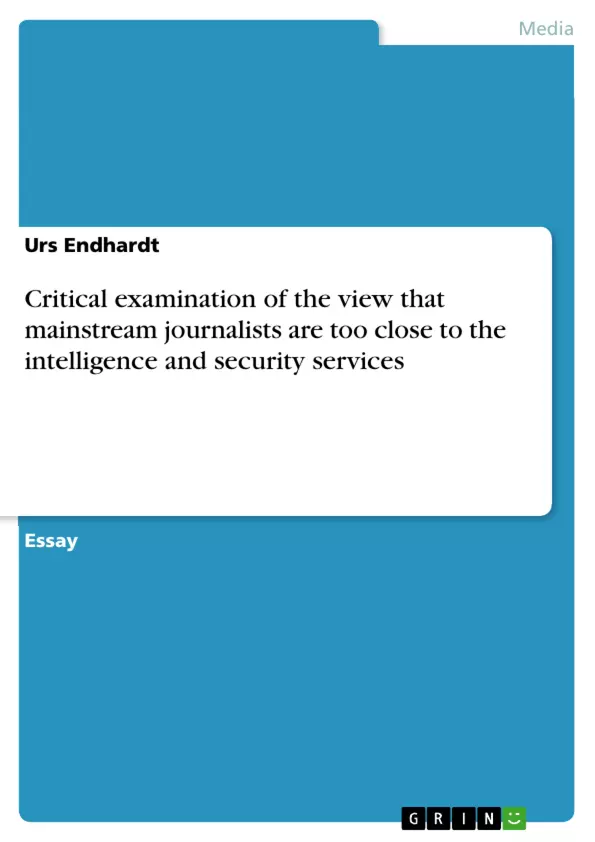“Intelligence sources in Pakistan have said that Miss al-Sadah, and the other relatives of bin Laden currently in hospital will be returned to their countries of origin when they have recovered” (Daily Telegraph, May 5 2011).
“Intelligence sources revealed terrorists intend to target Belfast or Derry to send out their anti-British message on the day Prince William and Kate Middleton marry” (The Mirror, April 25 2011).
“UK spooks were last night in a desperate race to track ten terrorists recruited for a Mumbai-style attack in Europe. A Sun probe reveals intelligence sources believe the cell is committed to a strike before Christmas” (The Sun, October 9 2010).
These three quotes from major British newspapers depict the ongoing willingness of journalists to use information from anonymous sources. Whoever thinks that the information disaster during the build-up of the Iraq War, when the UK press regularly published wrong reports based on intelligence sources, has stopped them from continuing this practice, is wrong. But of course this is nothing new. This procedure has been going on for the last sixty years, and not even the most outlandish disinformation campaigns in the past have kept the press from going to bed with spies.
In this essay, I want to explore the reasons that lie behind this behaviour. Why do journalists accept information from intelligence sources so willingly? What are the dangers, but also the benefits of this behaviour? What happens if journalists cross the line and work for the intelligence services? And what reasons do spooks have to disguise themselves as hacks? And last, but not least: What has James Bond got to do with it?
Inhaltsverzeichnis (Table of Contents)
- Introduction
- Origins
- Spying Hacks
- Hacking Spies
- Planted Stories: The Use of Intelligence Sources
- Positive Aspects
- Conclusion
Zielsetzung und Themenschwerpunkte (Objectives and Key Themes)
This essay examines the historical and contemporary relationship between journalists and intelligence services, focusing on the reasons behind journalists' willingness to accept information from anonymous sources. It explores the dangers and benefits of this practice, analyzes the motivations of both parties involved, and investigates the complexities of this dynamic, including instances of journalists working for intelligence services.
- The historical origins of the relationship between journalists and intelligence services
- The motivations of both journalists and intelligence services in this relationship
- The dangers and benefits of journalists accepting information from anonymous sources
- The impact of this relationship on the credibility and integrity of journalism
- The blurring of boundaries between journalism and intelligence activities
Zusammenfassung der Kapitel (Chapter Summaries)
- Introduction: This chapter sets the stage by providing examples of how journalists use information from anonymous sources, highlighting the ongoing willingness of the press to rely on intelligence sources, even after the controversies surrounding the Iraq War. It introduces the key questions that the essay seeks to answer, focusing on the motivations behind this behavior and the consequences of this dynamic.
- Origins: This chapter traces the origins of the relationship between journalists and intelligence services back to World War II, showing how the practice evolved from wartime propaganda to a more complex and nuanced relationship in the post-war era. It highlights the active use of journalism as a cover for intelligence operations and the recruitment of journalists by intelligence agencies.
- Spying Hacks: This chapter explores the prevalence of journalists with links to intelligence services, providing specific examples of prominent journalists who have been connected to these agencies. It examines the similarities between journalism and espionage, highlighting the ways in which intelligence services cultivate relationships with journalists, often through lavish inducements and social pressures.
Schlüsselwörter (Keywords)
This essay explores the complex relationship between journalism and intelligence services, examining the motivations and consequences of journalists accepting information from anonymous sources. Key topics include: intelligence sources, anonymous sources, media ethics, propaganda, national security, press freedom, espionage, disinformation, and the blurring of boundaries between journalism and intelligence operations.
Frequently Asked Questions: Journalists and Intelligence Services
Why do journalists rely on anonymous intelligence sources?
Journalists often use these sources to gain exclusive information on national security or terrorism, despite the risks of disinformation.
What are the dangers of being too close to intelligence services?
The main dangers include becoming a tool for propaganda, losing journalistic integrity, and publishing planted or false stories.
What is the historical origin of this relationship?
The relationship dates back to World War II, evolving from wartime propaganda to complex post-war cooperation and recruitment of journalists by agencies.
How do intelligence services use journalists as "cover"?
Agencies sometimes plant "hacks" (spies disguised as journalists) to gather information or influence public opinion without raising suspicion.
How did the Iraq War affect this dynamic?
The Iraq War served as a major example of an "information disaster," where wrong reports based on intelligence sources severely damaged media credibility.
- Arbeit zitieren
- MA Urs Endhardt (Autor:in), 2011, Critical examination of the view that mainstream journalists are too close to the intelligence and security services, München, GRIN Verlag, https://www.hausarbeiten.de/document/179459


